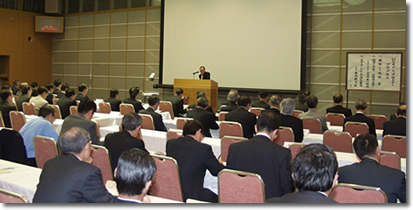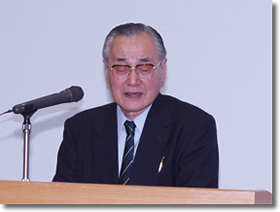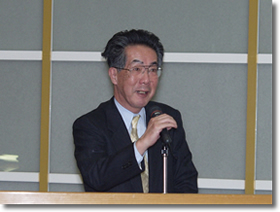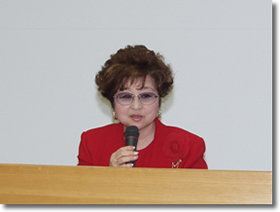|
|
 |
On April 5, 2002, the Fiscal 2002 Top Seminar was held for the top management and general manager-level middle management of member organizations at the Keidanren Kaikan Hall, in Ote-machi, Chiyoda-ku, Tokyo. About 100 individuals participated in the event.
At the seminar, invited lecturers were Mr. Shuichiro Yamanouchi, president of the National Space Development Agency of Japan, and Ms. Noriko Kimoto, a critic and journalist. The former spoke of the basics of safety that he gleaned from his experiences in the railway and space industries. And the latter spoke of the need for media training.
|
 Lectures
Lectures
|
 President Makino
President Makino
|
At the opening of the seminar, President Makino introduced such topics as "The recent energy situation," "The achievements of NSnet activities," and "Policies for future activities."
"The U.S. terrorist attacks that happened in September of last year affected various areas, and in advancing nuclear power in the future, thorough safety measures have become the foundation. From that perspective, it is considered that the importance of NSnet, which was established to secure safety in the nuclear power industry, will continue to increase."
|
 Mr. Yamanouchi
Mr. Yamanouchi
|
Mr. Yamanouchi's talk was titled "From railways to space...a fight with credibility." In his talk he introduced details centered on his experiences before entering the National Space Development Agency of Japan during the long time he spent working for the Japanese National Railways (JNR) and in the JR era. He also touched on the necessary strategic measures and attitude of top management in securing safety.
"As for strategic safety measures, the high road is knowing system characteristics (weak points), and adopting measures that focus on those areas. Toward that end, it is important to grasp the characteristics (weaknesses) of the said system from several events thought to be signs of a major accident."
"In addition, as the foundation of safety, psychological theories are also important, but the establishment of systems is crucial, as is fostering a culture that reveres safety."
"On the other hand, useless for achieving true safety are leaders without a safety strategy but who merely repeat the phrase "safety first." Also included in this category are top management preoccupied with spiritualism, and at the on-site level, workers proud of cutting corners and foremen who approve of such behavior."
|

Ms. Kimoto
|
Ms. Kimoto's talk was titled "The necessity of media training," in which she gave specific examples from a journalist's standpoint regarding how to respond to the media in order to obtain the understanding of citizens with regard to nuclear power safety.
"Although all companies recognize that the importance of PR is that PR is the point of contact with the people, it is difficult to say that their response is sufficient. First off, it is important to listen widely to the opinions of the citizens in "hearings" prior to conducting the PR, carefully watching how people accept the PR information."
"In addition, upon understanding the media's characteristics, such as the fact that the media have the power to manipulate public opinion either consciously or unconsciously, leaders such as business people and politicians, and the like, should undergo media training for accurately conveying information (PR) as a kind of crisis management."
"It is important to explain information, such as safety measures, that should be known by citizens in one's own words with an unassuming stance. False, biased and unsubstantiated information by the media should be responded to and countered vigorously."
The following were opinions expressed about NSnet activities:
"The NSnet activities are inward looking, without any apparent connection to society. To what extent has the "safety culture" espoused by NSnet infiltrated to the general public? How is the public thinking about "safety culture"? How does the public view NSnet activities? We should be acting with these ideas always in mind. For that purpose, I think we should further utilize the media."
|
|
|







